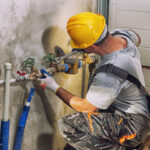Plumbers Bradenton fix the pipes that deliver clean water and remove waste from homes and businesses. They can work as independent contractors or for companies that employ them.
 The trades suffer from a shortage of skilled workers, and plumbing is no exception. A career as a plumber can be rewarding and lucrative, but it’s not for everyone.
The trades suffer from a shortage of skilled workers, and plumbing is no exception. A career as a plumber can be rewarding and lucrative, but it’s not for everyone.
Many people are familiar with the work plumbers do to fix leaky faucets or clogged drains, but these skilled tradespeople offer much more than just emergency services. Plumbers also install piping and fixtures for homes and businesses. This includes water supply lines, sewage systems, and fixtures like sinks, toilets, showerheads, and dishwashers. In some cases, plumbers may even install entire plumbing systems for new construction or remodels.
Before installing a pipe, plumbers dig trenches and prepare the soil for the pipe’s route. They may use manual digging or trenching machines to create the necessary space. Then, they can lay the pipes in a concrete or metal conduit to direct water and sewage where it’s needed. Pipes can be made from a variety of materials, including clay, cast iron, or plastic. Plumbers are trained to work with each type of material to ensure the quality and longevity of the pipes they install.
Plumbers can also test a home’s water pressure to ensure it’s adequate for household usage. They’ll attach a gauge to the outdoor hose bib and check for signs of leaks, corrosion, broken or loose connections, and other issues that could affect function. They’ll also check for proper drainage and if there are any problems with the water heater that could cause safety hazards.
Another service plumbers provide is a pre-purchase inspection for houses or apartments. This helps potential buyers understand the state of the plumbing system and may even prevent costly repairs after the sale. The plumber will inspect all visible pipes for leaks, cracks, and rust, as well as the condition of all fixtures and appliances. The plumber will then provide a written report that documents the current condition of the plumbing system.
While most skilled tradespeople must complete a formal education program before starting their careers, plumbers often get the opportunity to learn on the job. This means that they earn while they learn and gain valuable experience working alongside a master plumber. While a high school diploma or equivalent is usually enough to start an apprenticeship, those who wish to become master plumbers will need more advanced training. These courses cover topics such as plumbing theory, pipe fabrication, fitting identification and usage, water chemistry, and plumbing code regulations.
Maintenance
Plumbers are responsible for the installation, maintenance, and repair of plumbing systems in residential, commercial, and industrial settings. These systems include pipes, fixtures, and appliances such as sinks, toilets, bathtubs, and water heaters. They install these systems according to building codes and blueprints, and ensure that they are functioning properly. This includes ensuring that there are no leaks or cracks in the pipes, checking for gas and water leaks, and conducting regular inspections of plumbing appliances.
Plumbers also work on plumbing systems in office buildings, retail spaces, hospitals, and restaurants. These systems are larger in scale, and require more specialized knowledge and equipment. Additionally, plumbers working on commercial and industrial plumbing systems must be able to collaborate with architects and construction teams to ensure that the plumbing is integrated seamlessly into the overall building design.
Service and repair plumbers are the troubleshooters of the plumbing world. They are called in when there is a problem, such as a clogged drain or a burst pipe. Plumbers use a variety of tools to diagnose and repair these problems. They must be able to identify the source of the issue, determine whether it is an easy fix, and estimate how long the repairs will take.
In addition to these general responsibilities, some plumbers may be responsible for installing and maintaining irrigation and sprinkler systems. These systems are used to manage water supply and drainage in large outdoor areas, such as golf courses and recreational facilities. Plumbers who are skilled in these types of installations can make a significant impact on the sustainability and efficiency of these systems.
Plumbing is a skilled trade that offers a number of benefits, including job security and a sense of accomplishment. However, it is important for plumbers to consider the drawbacks of the career, such as potential health risks, unpredictability in the work schedule, and an increased risk of injury when working with hazardous materials or confined spaces. To mitigate these risks, plumbers can practice safe work procedures, wear protective gear when handling hazardous materials, and invest in continuing education to stay updated on the latest industry technologies and techniques.
Repair
Plumbing systems are complex, and a plumber’s job goes beyond unclogging drains. The actual tasks of a plumber include designing, installing, and repairing piping that disperses water, removes waste, and connects appliances like dishwashers and washing machines. They also assemble, install, and repair equipment used to produce electricity, heat, and cooling. Plumbers often work on large-scale projects, such as laying out the pipework for kitchen and bathroom renovations in new homes or apartment buildings. They may even work on industrial plumbing systems in factories or power plants.
A professional plumber can perform a thorough inspection of your home’s plumbing system to find any issues that need repair. During the inspection, they’ll check all visible water supply pipes for leaks, corrosion, breaks, or any signs of wear. They’ll also test your plumbing fixture’s water flow and pressure to ensure adequate performance. They’ll look for clogs, excessive water usage, or any unusual noise or smells coming from your fixtures and plumbing. In addition, they’ll check your sewer line for any leaks or blockages.
When performing a plumbing inspection, a plumber will use high-tech methods like camera pipe inspection to get a close up look at hard-to-reach areas. Then they’ll create a detailed report that lists the findings, recommended repairs, and cost estimates. This helps homeowners decide which fixes are urgent and which can wait.
The inspection also identifies potential safety hazards, such as exposed electrical wiring, corroded pipes, or inadequate venting of exhaust gas. Plumbers can fix these hazards before they become serious problems that put the occupants of your home at risk.
In some cases, a plumber can help you prepare your home for sale by conducting an inspection and providing documentation of the condition of the plumbing system. This can help prevent costly issues from popping up shortly after the sale, and it protects both the buyer and seller from liability. The demand for plumbers is almost always steady, as people need water and sewage services to live. However, there are some times when plumbers are busier than others. One of the reasons is that plumbers can offer emergency services, such as unclogging drains and fixing leaking toilets.
Customer Service
The best plumbers go beyond the call of duty to make sure customers are satisfied. They might do things like offer DIY workshops to teach people how to avoid plumbing issues or give free consultations on new water heater installations. This goes a long way towards earning customer trust and making you the plumber they think of first when something goes wrong in their homes.
Another way to stand out is by offering 24/7 emergency services. Many times, the most serious plumbing problems happen at the most inconvenient time. A homeowner might call your office at 3am as water gushes out of their kitchen sink, and they want to know that someone is available to help them right away. Make sure your plumbers have the tools and equipment necessary to come to their rescue at any hour of the day or night.
Some of the top plumbing companies also have live chat support options. This allows customers to communicate with a friendly representative and find answers to their questions in a timely manner. It’s important to offer this type of service as it gives customers peace of mind that their concerns will be addressed immediately and their problems solved quickly.
A good plumber will offer honest pricing and competitive rates. This is especially important for customers who have a limited budget. They should never try to take advantage of customers or overcharge them for their services. It’s also a good idea to provide flexible payment options, such as monthly financing, for qualified applicants.
When choosing a plumber, it’s also a good idea to ask for references from past clients. This will allow you to get a firsthand account of the plumber’s work quality, professionalism, and reliability. It’s a great way to assess whether they’re the right fit for your needs. Some plumbers may even offer a money-back guarantee if you’re not satisfied with their work.
Some plumbers also provide package deals, such as drain cleaning and sewer line replacement bundles, that can save you money on the services you need. These types of deals are a great way to attract new customers and increase revenue.



